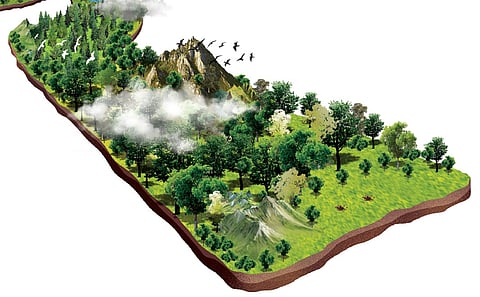

KOCHI: Malaria, amoebic meningoencephalitis, and now Nipah, Kerala has of late been witnessing outbreaks of several zoonotic diseases. According to experts, dense forest cover, extreme climate change, and the large migrant population make the state prone to such infections.
The chances of zoonotic diseases increase when human-animal interaction increases, says Dr Dipu T S, associate professor of infectious diseases in the department of Internal Medicine at Amrita School of Medicine. “The re-emergence of the Nipah virus indicates that the reservoir is still there. When man-animal interaction increases the chances of spread of these viruses from animals or birds to humans also increase. Humans may not be naturally immune to viruses that circulate among animals and birds,” he said, adding that diseases spread when boundaries are violated. “As an ecosystem, we cannot eradicate these viruses and bacteria. However, humans need to be cautious against the spread of the diseases,” he added.
A zoonosis is an infectious disease that has jumped from the animal world to humans. This happens when some process or activity brings people closer to the animals. “The Nipah virus naturally circulates in fruit bats. But we still do not know how exactly the jump happens. Forests along the Western Ghats can be a contributing factor. But we cannot blame it on deforestation. Bats freely visit human habitations where fruit trees are in plenty,” said Dr Rajeev Jayadevan, chairman of state IMA research cell. Climate change also leads to the spread of certain viruses. “Some diseases, like leptospirosis, or mosquito-borne diseases like dengue are spread after monsoon and flooding. Some viruses multiply in warm weather conditions,” said Dr Dipu, adding that extreme weather conditions and fluctuations can also lead to the spread.
The huge migrant population in the state is also prone to infectious diseases. “We have lakhs of migrant labourers in Kerala, who come from several different states that have different endemic diseases that are not common to Kerala. Many of them work in the food industry. Providing them with better living conditions, safe water, sanitation and education on hygiene can help prevent the spread of diarrhoeal diseases including cholera. besides malaria and dengue,” Dr Rajeev said.
He added that the state needs to improve planning to prevent the spread of diseases. ‘The health system has to adapt to changes that are occurring, including urbanisation and demographic shifts. We have to foresee the problems and take preventive measures rather than react each time there is a crisis.
For instance, scientific disposal of septic waste is urgently needed to prevent water-borne diseases. Mosquito control measures have to be upgraded. Addressing the root cause is also very important in dealing with such situations, for instance, don’t allow water to stagnate so that mosquitoes can’t lay eggs,” he emphasised, adding that preventive measures should be given more priority than reactive strategies.
According to Dr Dipu, the better surveillance system in the state has helped to detect the presence of viruses. “The health department has a strong surveillance system and we investigate the cause when there is a sudden death. While we criticise the lack of preparedness of the state government in preventing multiple occurrences of zoonotic diseases, we should also appreciate the efforts taken by the health department to investigate it,” added Dr Dipu.